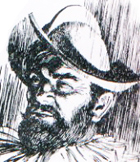Over the next few decades the Spanish continued their quest to build settlements here, but most were temporary and quickly abandoned, as the indigenous Indians continued to fiercely resist the presence of Europeans.
 Spain was persistent, and eventually prevailed, as a permanent settlement was finally established near present-day Buenos Aires in 1580.
Spain was persistent, and eventually prevailed, as a permanent settlement was finally established near present-day Buenos Aires in 1580. 200 years later the Spanish combined their influences inArgentina, Bolivia, Paraguay and Uruguay into theViceroyalty of the Rio de la Plata. It was a shaky coalition at best, and collapsed outright when Napoleon successfully invaded Spain and overthrew the Spanish monarchy.
During this short-lived era, Buenos Aires was transformed into a flourishing port and commercial center as exports of regional products (especially cattle) brought huge revenues into the city.
In 1816, local upstarts proclaimed their immediate independence from the remnants of the Spanish Crown; royalists vigorously objected, and it took civil war to defeat them.
 At the end of that war, anarchy prevailed, and when General Juan Manuel de Rosas was elected governor of the Buenos Aires Province in 1829, some level of peaceful coexistence returned as he combined all of the regional factions and provinces into one - The Argentine Confederation.
At the end of that war, anarchy prevailed, and when General Juan Manuel de Rosas was elected governor of the Buenos Aires Province in 1829, some level of peaceful coexistence returned as he combined all of the regional factions and provinces into one - The Argentine Confederation. Rosas was overthrown in 1852 by revolutionists, and for many years to come Argentina would experience border disputes, hostile invasions and regional wars. Near the end of the 19th century civilian rule brought some levels of peace, and Europeans (by the millions) mostly Spaniards and Italians, emigrated to this (land of promise) and as the 20th century began, a new Argentina emerged as one of the leading nations of South America.
Then, the guaranteed-to-fail military coup concept returned to Argentina; and all would collapse over time, including the rule of Juan Peron, and his powerful wife Eva (Evita). The last traces of military leadership faded away after Argentina's defeat at the hands of the British, during theFalkland Island's War.
Since democracy returned in 1983, this country has survived its share of economic, political and social problems, and today in Argentina, democracy is alive and well.
No comments:
Post a Comment